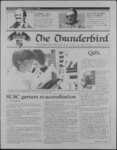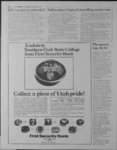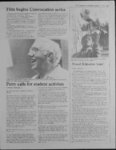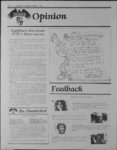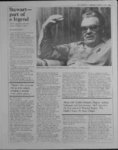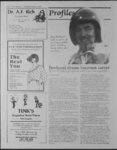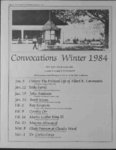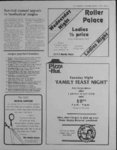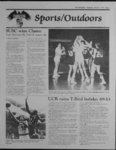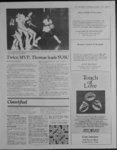| OCR Text |
Show HSRSMBSffil HUGHES BARBER TELLS STORIES. FARRELL FILM WILL SCREEN. SUSCs winter Convocation Series begins with 'Citizen, M ell Stewart, who d MASHs Mike film by Farrell. Farrell will appear next week. SEE PAGE 3. Une ; y fa once served as Howard Hughes barber, is an SUSC custodian who loves to talk about his former boss. SEE PAGE 7. II Ummdermrd THE STUDENT NEWS AND VIEWS OF SOUTHERN UTAH STATE COLLEGE CEDAR CITY, UTAH Q&A In addition to his duties as Cedar Citys postmaster, Frank Petty is a member of the Utah State Board of Regents, appointed to the board last July by Gov. Scott M. Matheson. Here he discusses several pressing questions concerning the problems facing higher education. Q. How do you see our current, overall state I higher education 7 A. We are facing SUSC garners by Tamara Rumbaugh The financial base of SUSC and areas related to it were the only negative points raised by the committee which has reaccredited the institution. evaluation by the Northwest Association of Schools and Colleges, chaired by Rodney Decker, was based on an October visit to the campus by an y of the schools accreditation committee and a strengths and weaknesses. The report from the committee was full of numerous acclamations for the dedication of the faculty and staff, the personalized instruction given students, the general operation of the college and the overall quality of the academic programs, said Michael D. Richards, assistant to the president. The self-stud- The major concern they reported was the financial base of the college. The commission highlighted the low salaries for faculty and staff and the inadequacies of the library, its equipment and supplies. Richards added that the colleges financial situation has been brought to the attention of the legislators many times in the past several years. However, the response hoped for has not been realized as of yet, he said. The committee report noted that it expects to see progress toward financial improvement and will return to the college in 1986 for a follow-up- . accreditation The report noted that the committee also felt the faculty teaching load was excessive and there was a shortage of scholarly activity in some respects. According to Richards the SUSC faculty has a 25 percent to 75 percent work load above the average of other schools. This leaves instructors with little time left over to engage in much academic research, he said. We have the faculty that go the extra mile, but the entire faculty as a whole has difficulty doing that. They have an average of 15 hours a week in the classroom and that is not including class preparation time, outside time with students and time for paper work. The burden is on the legislature. As a public institution our source of income is from public funds. And especially with the projected enrollment increase Wc are expecting, proper funding is going to be even more important to maintaining our vitality, Richards said. The committee was very impressed with the entire fine arts program; art, theatre, communications, English, business and teacher education programs. remain optimistic, said Richards. I think we are going to see more funding We anticipate the opportunity to present our case this year first hand to the state legislature. I think we are in a very good position. The regents see our needs and recognize our shortcomings, which are almost entirely based or. our financial situation. I think the regents have taken a major step to make some proposals to the legislature on our behalf. 1 some real serious problems. 1 feel that its time that Utahns realize that we cant go on the laurels that we have had in the past. Weve gone on number of have the we that greatest saying students graduating from high school who go on to college. We were number one or number two for many years. We had the highest percentage of graduates from college of practically any state; those who came out of high school and started college finished. Now we have to come to grips with the idea do we want to continue with this, and if we do then lets get ourselves ready for it. Lets tell the legislature this is what we want. Why doesn't SUSC receive equal funding to that of comparable institutions m Utah 7 Q. A. The State Board of Regents categorized our Utah higher education and then they took what they considered were comparable institutions throughout the nation. They picked several of these and tried to make SUSC comparable to the average of these others. Some of us on the Board of Regents felt that the comparable list for SUSC was not actually comparable. It was not fair; so in July in our first meei ng it came up and there was much discussion about it. The comparison actually placed SUSC be'ow Dixie College in salary levels. In the July meeting the Board of Regents moved SUSC up to a comparable list, the same comparable list as Weber State College. Now if we can get salaries at SUSC up to what Weber State has, Id feel very good. (continued on page 3) |
